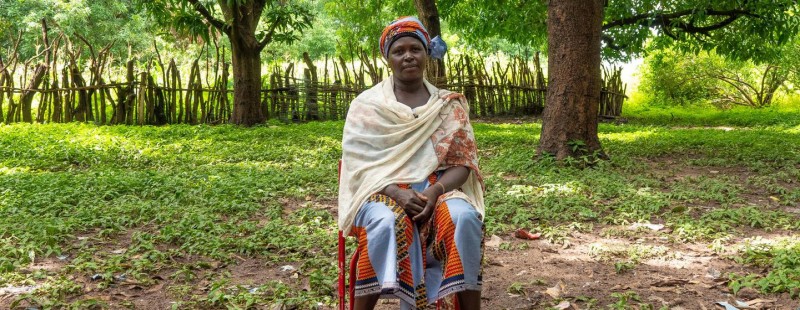Tombong Njie suffered as a result of the ‘witch hunts’ instigated by former President of The Gambia, Yahya Jammeh. After two decades of dictatorship, The Gambia is on the road towards democracy and respect for human rights, The UN is working closely with the government on this journey, a process that involves facing up to the country’s violent past. For Isatou Ceesay and Tombong Njie, the term “witch hunt” is not metaphorical. Under the regime of former dictator Yahya Jammeh, they were both literally condemned as witches. “He held people in custody, tortured them, and that was the end of them,” says Ms. Ceesay. “We were so embarrassed to go out. We are not witches,” adds Ms. Njie. During his 22 years in power, former President Jammeh severely weakened the country’s institutions and security apparatus. The regime was characterized by harassment; torture; the murder of political figures, journalists, activists, and students; and significant sexual and gender-based violence against women and children. Ms. Ceesay, Ms. Njie, and many other Gambians still carry the scars of the abuses of the witch hunt campaign, which began in 2009 and lasted several years. Victims struggled to escape the stigma associated with witches. Isatou Ceesay, a victim of the Gambian ‘witch hunt’ campaign. In 2016, the Gambians voted out President Jammeh, and the new President, Adama Barrow, was sworn into office in February 2017. However, the nation of two million people faced a severe political and social crisis with the absence of independent or effective justice institutions and rampant human rights abuses. The political transition required urgent reforms to overhaul the country’s institutions, promote democratic governance, address past human rights abuses and establish respect for the rule of law. One of the ways that the UN has helped to support this transition is through the UN Secretary-General’s Peacebuilding Fund, which provided funds aimed at critical areas, such as security sector and justice reform. The UN’s close collaboration with the authorities, under President Barrow, laid the foundations for two major institutions in December 2017: The National Human Rights Commission and the Truth, Reconciliation and Reparations Commission (TRRC), which is made up of eleven people, and designed to reflect the diverse ethnic, religious, and gender make-up of the country. Tombong Njie suffered as a result of the ‘witch hunts’ instigated by former President of The Gambia, Yahya Jammeh. In January 2019, public truth and reconciliation hearings began, with victims and perpetrators giving their personal testimonies. The hearings and outreach activities generated great public interest and broad popular participation, including youth and civil society. “The TRRC is very important. I have seen how it has helped people empathize with us, knowing that we were deliberately and wrongfully accused,” said Pa Demba Bojang, a victim of the witch hunt campaign. “People now aspire to live in peace in this country. Victims’ lives have become better thanks to the help they got from the project. The project has brought back hope in The Gambia,” said another victim. The hearings were broadcast live to on television, radio, and online platforms such as YouTube and Facebook. They would not have made for easy viewing, covering incidents of human rights violations, including torture, enforced disappearance, arbitrary arrests, unlawful detention/killings, and sexual and gender-based violence. Ya Jai Bahoum, a victim of the repressive regime of Gambian dictator Yahya Jammeh The UN Peacebuilding Fund played a key role in enabling the hearings to take place. It enabled the Commission’s office to open, provided key equipment, technical support to the Commissioners and the staff, and helped ensure victims access to the TRRC proceedings, which involved reaching out to those in the most remote areas of the country. Some 2,000 people benefitted from the Victim Participation Support Fund, which provided psychosocial support and essential medical interventions. In addition, 30 persons were provided with comprehensive witness protection. Beyond the hearings, over 34,000 Gambians have involved in outreach missions on the transitional justice process, and taken part in workshops, held in close partnership with civil society organizations, religious and traditional leaders. Since it began holding hearings, the Commission’ participatory and accessible process has helped to foster national reconciliation. “We were wrongfully accused. Some pointed fingers at us, but TRRC helped us overcome this shame,” said another victim of the witch hunt campaign.
Supporting a difficult transition

Bringing back hope to The Gambia

Supporting the victims
The PBF in The Gambia
The World Organization for Development has been endowed with consultative status with the UN ECOSOC since 2014. The World Organization for Development, which has consultative status wich the UN ECOSOC, develops and implements Global Initiatives to achieve the UN Sustainable Development Goals.




Comments are closed.